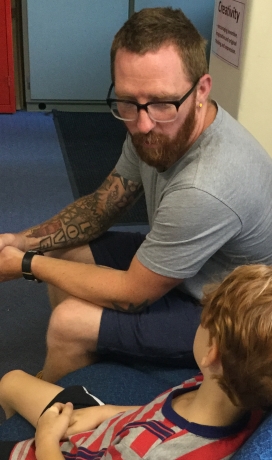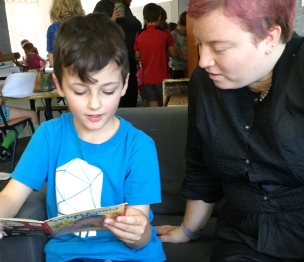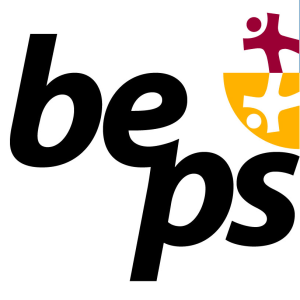Building on from two weeks ago when I blogged about Parent participation in your child’s learning I have had a couple of parents request for some more practical suggestions about how they might help children learn and develop a love of learning. I wrote about a number of ways you can support your child’s learning such as reading, modelling and I mentioned talking and today I want to build on the idea of talking because I believe that this is an important skill to have at all levels of life.
I have a long experience of learning, being a parent and talking but it does not in any way make me an expert. However, I appreciate the questions that I have been asked and so today I offer what advice I can and from the research I have done. However, a couple of things to keep in mind:
- You do not need to do ALL of these things ALL of the time. You will exhaust yourself and your child/ren. Find out what works for you and do that when you and your child want to have some fun.
- Some of you will have other activities that you do that you can share. So join in and make a comment and share your ideas. That is what makes a community.
- Have fun, there are no absolutely no right ways to bring up children. Love them lots, laugh as often as possible and treasure the memories.
Building vocabulary and conversation
We’ve known for a long time that the number of words a young child hears matters, because children who hear a greater number of words from a young age have a better vocabulary, language, and reading comprehension skills than those who heard fewer words. This intuitively makes sense to all of us but researchers back this up in a number of different studies.
However recent research concludes that it is not just the number of words a child hears but the quality of the interaction between the adult and the child that has the biggest impact. It turns out that it’s the kind of conversation a child is engaged in, rather than the number of words they hear, that makes the biggest difference to language and literacy development.
So what is the best kind of conversation to build language and literacy?
 One in which you are both having fun. Let’s face it, it is just so much more likely to happen.
One in which you are both having fun. Let’s face it, it is just so much more likely to happen.
Pay attention to what your child’s likes about the books you read. Do they like the pictures, rhyme, story line, or genre? This gives you an insight into what to talk about and what to buy for their next birthday. It also helps them to share ideas and communicate effectively because you are talking about the bits they like.
When they use a simple word to describe a picture during reading, use it as an opportunity to introduce a more sophisticated word. For example, they say that, “the crocodile’s teeth are so big!” you could say, “You’re right – the teeth are gigantic! I’ve never seen teeth that big before! I wonder what they might eat with those teeth”. This of course must be said with full menace or terror in your voice while trying to devour your child. Remember it is really important to have fun? If you can remember to repeat the new word in other situations this will also help your child remember it. For older more mature children this may, or may not work, but the important thing is to listen to the vocabulary that they use and sometimes try to repeat what they have said by using broader vocabulary. This will also improve understanding.
Practice the art of being a storyteller and help your child to be one as well.
When you visit a place that your child has been to before, encourage them to tell you what happened last time they were there. It doesn’t have to be anywhere exotic. It could be the last time that we visited the supermarket. You can help by making a few helpful comments about things that you remember. Such as, last time you picked out the avocados for me! Do you remember how many you got (or how you decided which ones were ripe, or ………?). If you can’t remember too much detail then don’t let the truth get in the road of a great story. Makeup a story, embellish the details just a little (ok a lot) and again have fun using vibrant vocabulary, delightful descriptions and vexatious verbs.
This simple storytelling activity will encourage your child to be more observant, helps them to understand how stories are written, it is not some secret activity, and helps to improve their vocabulary.
Predictions
 Ask about what might happen this time at the supermarket. What would happen if we bought chilli sauce instead of jam? Or coffee beans instead of peanut butter? What would happen if we didn’t use a basket or trolley in the supermarket? We might develop some maths skills and save money because we could not buy much, or starve, or maybe we would have to shop several times a day and so get very fit. Just talking about all the possibilities develops creativity and may lead to other activities.
Ask about what might happen this time at the supermarket. What would happen if we bought chilli sauce instead of jam? Or coffee beans instead of peanut butter? What would happen if we didn’t use a basket or trolley in the supermarket? We might develop some maths skills and save money because we could not buy much, or starve, or maybe we would have to shop several times a day and so get very fit. Just talking about all the possibilities develops creativity and may lead to other activities.
Ask questions ?????????
When you are reading (or sharing screen time) with your child ask questions about what is happening in the book, in the pictures or what they think will happen next. “Why do you think that happened?” this helps your child remain engaged with the story and links cause and effect, critical thinking and improves comprehension. However, try not to be too annoying.
Again for more discerning readers ask about the meaning of a word, particularly if you don’t know what it means. I recently came across the word ‘Peripatetic’. It sounds great, but I had no idea of what it meant. I couldn’t get the meaning from the sentence it was in and so I needed to look it up. It means roving or travelling but from now on I will use peripatetic wherever possible. If you learn alongside your child you both learn. Maybe you could make one or two wild guesses before you look it up. Everybody’s vocabulary improves and you show to your child that learning is a lifelong activity.
Building resilience
Don’t solve all of your child’s problems but support them to think about what could be done. Let them try a couple of different solutions. They don’t have to get it ‘right’ the first time. They might learn a lot from the journey and discussion and they will certainly develop their problem solving capacity. The evidence is that praising them for their effort and not the outcome builds a positive mindset and builds their confidence to give this a go.
Seeing different perspectives
Help your child think about how others might feel by encouraging them to “put themselves in the shoes” of another person or character. While reading, you can ask your child how they might feel, what they would do if they found themselves in the same situation as the book’s main character. For example, “If you were Gerald the giraffe, and all the other animals laughed at you and told you that giraffes can’t dance, what would you do?” this strategy helps to build empathy and enables your child to practice articulating their feelings and their reactions. That might lead to a whole different discussion such as “how could we see that in a different way?”


Leave a comment